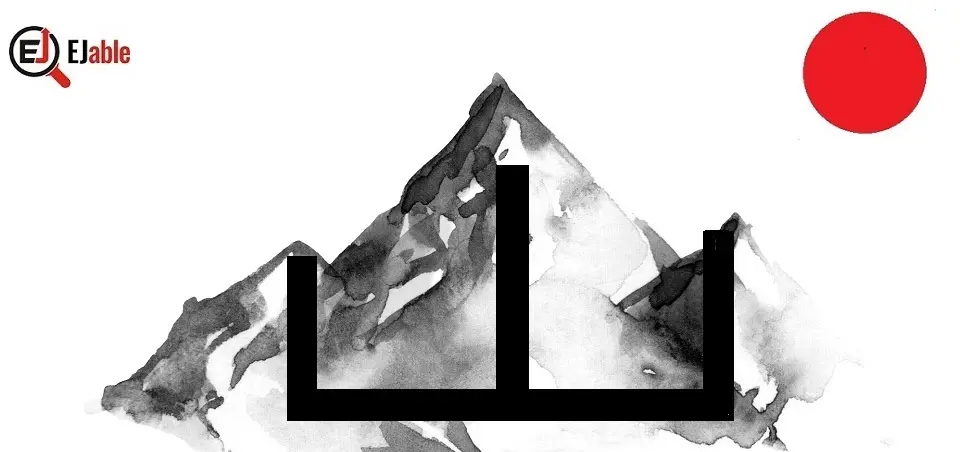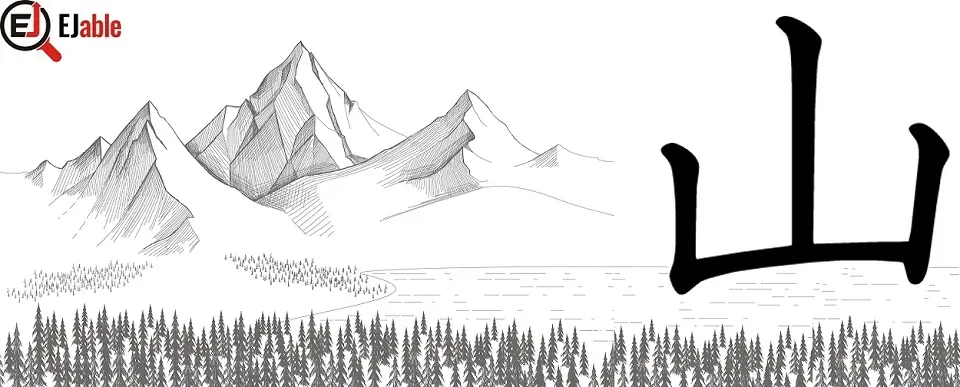Kanji for Mountain: 山 (“Yama” or “San”)

The kanji for “mountain” in Japanese is 山. The Kunyomi, or the Japanese pronunciation of the Kanji 山 is yama (やま). The Onyomi (Chinese) pronunciation of this Kanji is san (サン), when used in compound words like “Fujisan” (Mt. Fuji) or “Hakusan” (Mt. Haku). The onyomi, or Chinese reading, is “san” or “zan.”
Mountain’s Kanji is constructed with 3 strokes. This Kanji is a part of the JLPT N5 syllabus (please check the JLPT N5 Kanji list). In Japanese schools, this Kanji is taught in grade 1.
山 is one of the simplest Kanji in the Japanese writing system regarding structure and concept. Its simplicity reflects the importance of nature, specifically mountains, in Japanese culture.
Origin of the Shape 山
This Kanji originated from the pictographic representation of a mountain in ancient Chinese oracle bone script, where it looked like a series of three peaks. This depiction was simplified over time, and the modern character retains the three-pronged representation.
Mnemonic: How to Remember the Mountain’s Kanji (山)


Mountain (Yama/Sen) Kanji in Compounded Words
There are 334 Japanese words that begin with the Kanji 山, and it appears in 671 words.
The Kanji 山 is also often used symbolically. For instance, in the word “problems” or “difficulties” (問題山, mondai-yama), the use of “mountain” is to evoke the image of a formidable obstacle.
Moreover, the Kanji of Mountain is also used to denote an abundance of something, like in “山のように” (Yama no you ni), which translates to “like a mountain,” implying a large quantity of something.
Examples of Kanji 山 in Compounded Kanji Characters
Following are some examples of compounded words in the Japanese language with the Kanji of the mountain:
- 山岳 (sangaku): Mountains
- 山頂 (sanchou): Mountain peak
- 山脈 (sanmyaku): Mountain range
- 山地 (sanchi): Mountainous area
- 山岡 (sanoaka): Hill
- 山道 (yamamichi): Mountain path
- 登山 (tozan): Mountain climbing
- 山林 (sanrin): Mountain Forest
- 山荘 (sansou): Mountain villa
- 山腹 (sanpuku): Mountainside
However, please note that the pronunciation of the kanji can change depending on its position in the word and the surrounding kanji.
Difference Between Yama (山) and Sangaku (山岳)
The difference between 山 (やま, yama) and 山岳 (さんがく, sangaku) in Japanese lies in their usage and connotations:
- 山 (やま, yama):
- 山 (yama) is the basic term for “mountain” and refers to mountains in general.
- Yama is a common word for mountains in everyday language.
- 山 can refer to any size of mountain, from small hills to large mountain ranges.
- The Kanji 山 also appears in many compound words and place names.
- 山岳 (さんがく, sangaku):
- 山岳 (sangaku) specifically refers to “mountain ranges” or “alpine” regions.
- Sangaku is more technical and is often used in the context of mountain climbing, geography, or when discussing mountainous regions as a collective entity.
- 山岳 emphasizes the grandeur or the rugged, more challenging nature of mountains, often used in contexts like mountaineering or alpine sports.
In essence, 山 is a more general and common term for mountains. On the other hand, 山岳 is more specific and is typically for contexts where the focus is on the larger scale or more challenging aspects of mountains and mountain ranges.
山 as a Radical and Component in Other Kanji Characters
The kanji for the mountain also appears as a Kanji radical (山部, yamahen) and also as a component in more complex Kanji characters. Kanji 山 appears as a radical or component in 309 Kanji characters, including 29 Jōyō Kanji.
In such words, the radical of the mountain’s kanji lends its meaning to the overall interpretation of the Kanji.
Examples of 山 as a Radical
- 岳 (gaku): Peak. Interestingly, the word 岳父 (gakufu) means man’s father-in-law
- 峠 (touge): Mountain pass
- 崖 (gake): Cliff
- 島 (shima): Island
- 岐 (gi): Fork in road
- 嵐 (arashi): Storm
- 崩 (hou): Collapse
- 峰 (mine, みね): Peak or Ridge
- 崇 (suu): Adore
- 峨 (ga): High and steep
- 嶌 (shima): Island
- 岬 (Misaki): Cape, Peninsula
- 岸 (kishi): Beach
- 嶺 (rei): Mountain peak
- 峻 (shun): Steep
- 岩 (いわ, iwa): Rock, boulder
Compounded Words with Mountain’s Kanji and Radical of 山
Interestingly, in many examples above, the radical of Yama (山) appears with the whole Kanji of the mountain. This fact indicates the importance of mountains in the Japanese psyche and the cultural significance of mountains, as we shall see in the next section below.
Some examples of such words with mountain kanji appearing as radical as well as the full Kanji are as follows:
- 山岳 (さんがく, sangaku): Mountain range.
- 山岡 (やまおか, yamaoka): A hill or hillock, combining 山 (mountain) and 岡 (hill).
- 山峡 (さんきょう, sankyō): Mountain ravine, combining 山 (mountain) and 峡 (ravine).
- 山岩 (さんがん, sangan): Mountain rock, combining 山 (mountain) and 岩 (rock).
- 山嶽 (さんがく, sangaku): Similar to 山岳, emphasizing high mountains.
- 山島 (さんとう, santō): Mountainous island, combining 山 (mountain) and 島 (island).
- 山崎 (やまざき, Yamazaki): A place name combining 山 (mountain) and 崎 (promontory).
- 山島 (やましま, Yamashima): A surname combining 山 (mountain) and 島 (island).
These examples showcase how 山 is used both as an independent kanji and as a radical in compound words, highlighting the versatile nature of kanji in forming nuanced meanings related to geographical features and locations.
Cultural Significance of Mountain and its Kanji in Japan
The kanji for mountain, 山 (やま, yama), holds profound cultural and symbolic significance in Japan, deeply embedded in various aspects of Japanese life and identity.
Spiritual and Religious Significance:
Mountains have been revered in Japan for centuries and are often considered sacred spaces. Shinto shrines are frequently located on or near mountains, like the famous Mount Fuji, which is an object of worship and pilgrimage in Japan. Moreover, mountains are seen as places where the divine resides, offering a connection between the earthly and the spiritual realms.
Japanese Literature and Art:
Mountains have been a central theme in Japanese literature and art, symbolizing physical and spiritual beauty. They appear prominently in traditional Japanese paintings, woodblock prints (especially those by Hokusai and Hiroshige), and poetry, often embodying a sense of awe-inspiring natural beauty and tranquility.
Connection with Nature:
The Japanese aesthetic, deeply rooted in a connection with nature, often celebrates the beauty and majesty of mountains. This connection is evident in practices like “Shinrin-yoku” (forest bathing), where walking in the mountains is seen as a way to rejuvenate and restore one’s well-being.
Seasonal Changes:
The changing seasons, a central element of Japanese culture and art, are dramatically showcased in mountain landscapes. The seasonal transformation of mountains, from cherry blossoms in spring to fiery maple leaves in autumn, is celebrated and deeply appreciated.
Recreation and Escapism:
In modern times, mountains offer a place of recreation and escapism from the urban environment. For leisure and relaxation, hiking, skiing, and hot spring resorts in mountainous regions are popular among Japanese people.
Symbolism in Folklore and Mythology:
Mountains often appear in Japanese folklore and mythology. They are settings for many stories and legends, including those about yōkai (supernatural creatures) and hermits with mystical powers.
Symbolic Usage:
The kanji 山 also symbolically represents hurdles or high points in life, as in the phrase “overcoming a mountain” to indicate overcoming a significant challenge.
In summary, the kanji 山 for the mountain is more than just a character in the Japanese writing system; it’s a symbol with deep roots in the nation’s psyche, representing not only the physical features of a mountain but also a range of cultural, spiritual, and aesthetic values intrinsic to the Japanese way of life.
Do check other Kanji characters on the page “How to Remember Kanji“.


A long-term ex-pat in Japan, Himanshu comes with an IT background in SAP consulting, IT Business Development, and then running the country operations of an IT consulting multinational. Himanshu is the co-founder and Managing Director of ReachExt K.K. and EJable.com. He is also an Advisory Board Member of a Silicon Valley AI/IoT startup.

